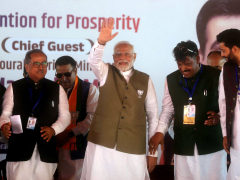New Delhi, India – Getting into one of the prestigious Indian Institute of Technology (IIT) schools was supposed to be the end of the financial woes for Parasand his family. Instead, things have only worsened due to the federal government’s long delays in dispensing Paras’s monthly fellowship allowance of 37,000 rupees ($435).
At the IIT, Paras is a research fellow, looking into solutions to a global public health crisis created by the spread of infectious diseases. His fellowship comes from the INSPIRE scheme, funded by India’s Department of Science and Technology (DST).
But delays in the scheme’s payment have meant that Paras was not able to pay the instalments on the laptop he bought for his research in 2022. His credit score plummeted, and his savings plans crashed.
Paras’s parents are farmers in a drought-affected region of western India, and their income depends on a harvest that often fails. So, he has resorted to borrowing money from friends, including as recently as between August and December, he told Al Jazeera.
Paras is not alone. Al Jazeera spoke to nearly a dozen current and former fellows enrolled in top institutes across India under the Innovation in Science Pursuit for Inspired Research (INSPIRE) programme. The interviewees studied at institutions such as the IIT, a network of engineering and technology schools across the country, and the Indian Institutes of Science Education and Research, another network.
All had gone from three to as long as nine months without a stipend.
The funding delays and procedural lapses have marred the fellowship and impaired their research capacity, they said.
Many researchers recently took to social media to complain, tagging Indian Prime Minister Narendra Modi and Minister of Science and Technology Jitendra Singh.
“For over a year now, many of us who are pursuing PhDs under DST-funded fellowships have not received our stipends,” Sayali Atkare, an INSPIRE fellow, wrote on LinkedIn. “This has pushed many young researchers into severe financial and emotional stress.”
Last year, India ranked 39th in the Global Innovation Index of 133 countries, up one spot from the year prior. It leads lower-middle-income countries like Vietnam and the Philippines in innovation. China leads upper-middle-income countries and is followed by Malaysia and Turkiye.
The federal government termed the ranking an “impressive leap” in a news release. It said that India’s “growing innovation potential has been supported by government initiatives that prioritise technological advancement, ease of doing business, and entrepreneurship”.
At a federal government conference in April, Modi boasted of India’s growing research acumen. Under his leadership in the past decade, the government has doubled its gross spending on research and development from 600 billion rupees ($7.05bn) to more than 1,250 billion rupees ($14.7bn), while the number of patents filed has more than doubled – from 40,000 to more than 80,000.
The numerous steps taken by the government – like doubling of expenditure on R&D (research and development), doubling of patents filed in India, creation of state-of-the-art research parks and research fellowships and facilities – ensure “that talented individuals face no obstacles in advancing their careers”, Modi said.>
However, an analysis of government documents, budgets and interviews with researchers reveals that the government is more focused on commercial research, primarily product development led by start-ups and big corporations. It is offering little funding for research conducted at the country’s premier universities.
For instance, in the current financial year, 70 percent of the Science and Technology Department’s annual budget has been allocated to a scheme under which interest-free loans are provided to private companies conducting research in sunrise domains, such as semiconductors.
At the same time, the government has made misleading statements about its investments in the country’s research institutes, including with schemes like the INSPIRE fellowship, where funds have actually been cut instead of being increased as touted by the government.

Poor pay, funding delays
The INSPIRE scheme offers PhD and faculty fellowships to “attract, attach, retain and nourish talented young scientific Human Resource for strengthening the R&D foundation and base”.
The fellowships are offered to top-ranking postgraduate students and doctoral researchers to conduct research in areas from agriculture, biochemistry, neuroscience and cancer biology to climate science, renewable energy and nanotechnology.
Under the scheme, PhD fellows are to receive 37,000 rupees ($435.14) to 42,000 rupees ($493.94) per month for living expenses and 20,000 rupees ($235.21) annually for research-related costs, such as paying for equipment or work-related travel.
Faculty fellows are offered teaching positions with a monthly salary of 125,000 rupees ($1,470) and an annual research grant of 700,000 rupees ($8,232).
In the year 2024-25, 653 fellows were enrolled in the PhD fellowship, and 85 in the faculty fellowship programme.
“I couldn’t attend an important annual meeting in our field because it required travel, and I was not sure if I would get my allowance,” a faculty fellow at an institute in eastern India said. He has not received his payments since September 2024.
Atkare, the PhD student who wrote about the government’s failure on LinkedIn, also wrote, “We’ve made endless phone calls, wr





